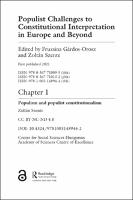Chapter 1 Populism and populist constitutionalism
Proposal review
Abstract
This book explores the relationship between populism or populist regimes and constitutional interpretation used in those regimes. The volume discusses the question of whether contemporary populist governments and movements have developed, or encouraged new and specific constitutional theories, doctrines and methods of interpretation, or whether their constitutional and other high courts continue to use the old, traditional interpretative tools in constitutional adjudication. Divided into four parts, Part I contains three chapters elaborating the theoretical basis for the discussion. Part II examines the topic from a comparative perspective, representing those European countries where populism is most prevalent, including: Austria, Croatia, the Czech Republic, Greece, Hungary, Italy, Poland, Romania, Spain, and the United Kingdom. Part III extends the focus to the United States, reflecting how American jurisprudence and academia have produced the most important contributions to the theory of constitutional interpretation, and recent political developments in that country might challenge the traditional understanding of judicial review. This section also includes a general overview on Latin America, where there are also some populist governments and strong populist movements. Finally, the editors’ closing study analyzes the outcomes of the comparative research, summarizing the conclusions of the book.
Keywords
Law, Constitutional Law, Constitutional Interpretation, Populism, Populist constitutionalism, Courts, Constitutional TheoryDOI
10.4324/9781003148944-2ISBN
9780367710095, 9780367710132, 9781003148944Publisher
Taylor & FrancisPublisher website
https://taylorandfrancis.com/Publication date and place
2021Imprint
RoutledgeClassification
Jurisprudence and general issues
Constitutional and administrative law: general
Comparative law
Legal systems: courts and procedures
Government powers
Laws of specific jurisdictions and specific areas of law
Constitution: government and the state


 Download
Download